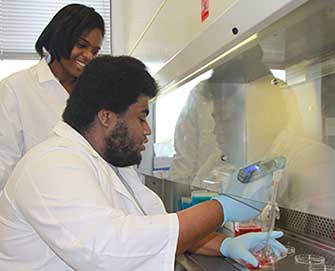We are now accepting applications for Summer 2026.



MU PREP provides post-baccalaureate scholars with broad training in a highly mentored environment to prepare them for entry into and successful completion of a PhD program in the biomedical sciences. Our program activities include research experience, coursework, and professional development. The specific mix of activities is individually designed to meet the needs of each scholar.
Rotations
Scholars complete research rotations in two laboratories before choosing a faculty mentor and lab for their independent research project. The rotations, which last 4-6 weeks, are designed to expose scholars to the variety of research opportunities and mentors on campus. Rotations also give scholars hands-on experience identifying research problems, developing testable hypotheses, designing appropriate methodology, and analyzing experimental results while also refining their research interests. At the end of the second rotation, each scholar will select the mentor with whom to complete his or her independent research project.
The Independent Research Project
While rotations are designed to provide exposure, the Scholar's independent research project is designed as immersion. Scholars will be fully involved in all phases of a faculty-mentored research project, from hypothesis development to communication of results. The project will involve original research with an opportunity for significant progress in eight months. Scholars work collaboratively with their chosen faculty mentors to select a project and then refine their hypotheses and experimental designs.
Research laboratories available for scholars are models of true teamwork -- with faculty, postdoctoral fellows, graduate students, and undergraduates all pursuing collaborative research projects. This mix of experienced professionals and students models modern collaborative science and provides a critical support group so that within a short time the Scholars become well integrated into the mainstream of MU’s biomedical research community.
Coursework is designed to meet each Scholar's specific needs and will include graduate-level courses in the Scholar's area of interest. In addition, all Scholars complete these four courses.
Experimental Design and Data Analysis is a one-credit hour workshop/mini-course held in the beginning of the first summer. The course provides a foundation in the principles of experimental design in the context of biomedical research. The goal is to effectively integrate the processes of developing research questions and hypotheses with the layout of experiments and assumptions of the statistical measures that will eventually be applied. Scholars are expected to apply the principles from the class to the design of experiments in their research rotations and then in their independent research projects.
The Graduate School Application/Admission Process is a one-credit course offered in the fall semester. The course addresses strategies for choosing doctoral programs and the application process. Topics discussed include elements of a great PhD program from a student's perspective and what makes a great applicant from an admission committee’s perspective. Scholars are given personal assistance with crafting and preparing a resume, personal statement, and statement of research experience. Scholars also participate in mock interviews to prepare for the rigor of doctoral program interviews.
Responsible Conduct of Research is a one-credit hour course offered in the spring semester. The course considers ethical, legal, and technical issues in the conduct of research. Topics covered include ethical standards in conducting and reporting research, including data management and sharing and determining fair and responsible authorship, peer review, mentoring, confidentiality in handling research materials and information, conflicts of interest, use of human subjects and animals in research, and misconduct. The course emphasizes practices to avoid ethical dilemmas.
We emphasize each Scholar's professional development including their scientific writing and oral communication skills. We work in concert with each Scholar to develop an Individual Development Plan when they first arrive on campus. This IDP guides the Scholar's program while in MU PREP. Professional development components include:
Professional Communication Development. This one-credit hour course each semester gives Scholars practice in critically reading primary literature, including analysis of experimental design and data. The course also enhances Scholars’ abilities to identify critical and/or questionable assumptions, critique author's conclusions, and design the next set of experiments.
Career Development Preparation. We begin using Next Gen PhD: A Guide to Career Paths in Science where Scholars first identify their interests, skills, values, and long-term goals and then reflect on how those align with career options for PhDs in science, expanding the range of careers beyond the lab bench. We continue that expansion in our partnership with Alternative Career Exploration in Science co-hosting events and speakers from a wide variety of potential careers including varied educational institutions, industries, government labs, research institutes, foundations, and positions in science policy and advocacy.
Participation in National Meetings. All Scholars present their research results at one (or more) national meeting in their discipline as well as at regional and local venues. Their research mentors accompany them to these meetings. MU PREP provides up to $4500 financial support for travel to two scientific meetings per year.
Participation in Lab Meetings. All Scholars regularly present their research results to their laboratory colleagues in a more informal setting.
All MU PREP Scholars receive a salary of $30,000 per year.
The program pays all tuition and course fees and graduate health insurance.
Scholars also receive $4,500 per year to travel to two scientific conferences.